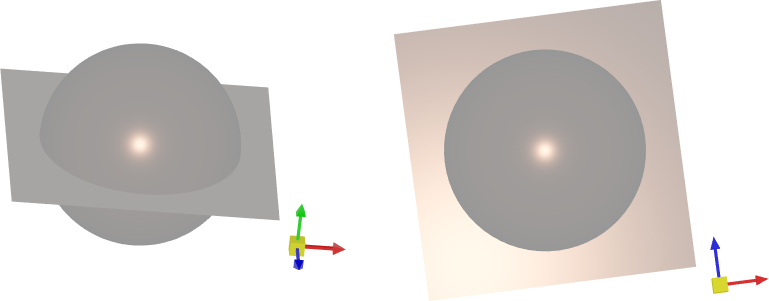Light¶
In Graphics3DControl, lights are used to illuminate 3D models. You can use the default light, or create custom light sources for your 3D scene.
Default Light¶
The Graphics3DControl provides the default light out of the box. The default light represents a white point light linked to the camera. Its direction is always synced with the camera's direction.
The following image demonstrates the default light reflected from a metallic plane.
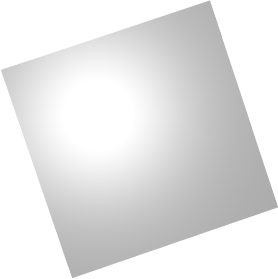
The actual visual effect of any light is determined by materials applied to 3D models.
Related Options¶
-
Graphics3DControl.AllowDefaultLight(default value istrue) — Set this property tofalseto forcibly disable the default light.When you create custom lights, the default light is automatically disabled.
Custom Lights¶
To add custom lights to a 3D scene, create light sources and add them to the Graphics3DControl.Lights сollection. You can also use the Graphics3DControl.LightsSource and Graphics3DControl.LightTemplate property to add custom lights according to the MVVM design pattern.
Graphics3DControl supports the following light source types:
- Point Light (
PointLight) - Directional Light (
DirectionalLight) - Camera-related Point Light (
CameraPointLight) - Camera-related Directional Light (
CameraDirectionalLight)
All these light sources have one ancestor, the Light abstract class.
Point Light¶
Radiates in all directions (like a light bulb).
Class¶
PointLight
Settings¶
Color— The color of the light.Position— The position of the light emitter.Radius— The radius of the light emitter.
Example¶
The following example creates a Point Light of the Coral color. The image below demonstrates this light reflected from metallic plane and sphere.
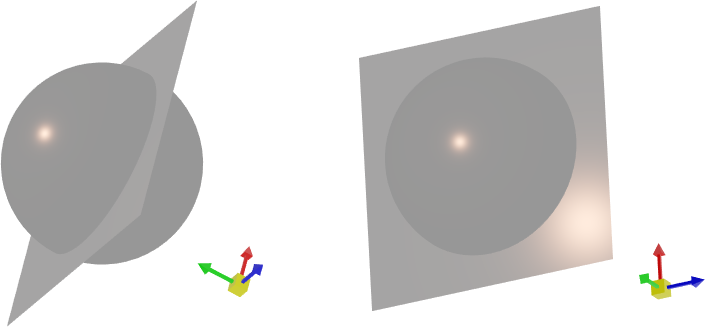
<mx3d:Graphics3DControl.Lights>
<mx3d:PointLight Color="{Binding MyLightColor}" Position="{Binding MyLightPosition}" Radius="10"/>
</mx3d:Graphics3DControl.Lights>
PointLight myLight = new PointLight();
myLight.Color = Avalonia.Media.Colors.Coral;
myLight.Position = new Vector3(0, 50, 0);
myLight.Radius = 10;
g3DControl.Lights.Add(myLight);
Directional Light¶
Emits parallel rays in a specified direction, simulating distant illumination (like sunlight).
Class¶
DirectionalLight
Settings¶
Color— The color of the light.Direction— A vector that specifies the direction of the light rays.
Example¶
The following example adds a Directional Light source pointed in the directon of the negative Y axis. The image below demonstrates this light reflected from metallic plane and sphere.
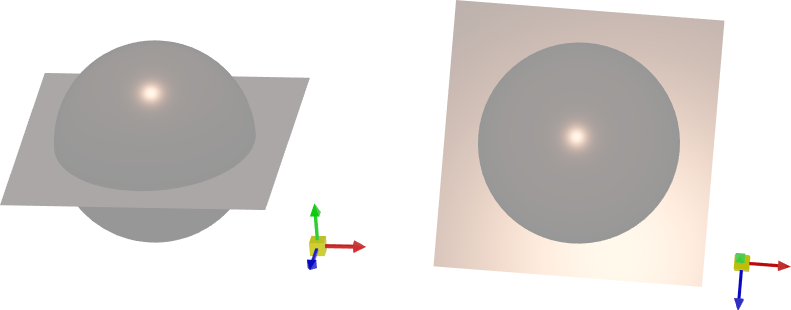
<mx3d:Graphics3DControl.Lights>
<mx3d:DirectionalLight Color="{Binding MyLightColor}" Direction="{Binding MyLightDirection}"/>
</mx3d:Graphics3DControl.Lights>
using Eremex.AvaloniaUI.Controls3D;
DirectionalLight myLight = new DirectionalLight();
myLight.Direction = new System.Numerics.Vector3(0, -1, 0);
myLight.Color = Avalonia.Media.Colors.Coral;
g3DControl.Lights.Add(myLight);
Camera-related Point Light¶
A point light emitted from the camera. The position and direction of this light are synced with those of the camera.
Class¶
CameraPointLight
Settings¶
Color— The color of the light.Radius— The radius of the light emitter.
Example¶
The following example creates a Point Light linked with the camera. The image below demonstrates this light reflected from metallic plane and sphere.
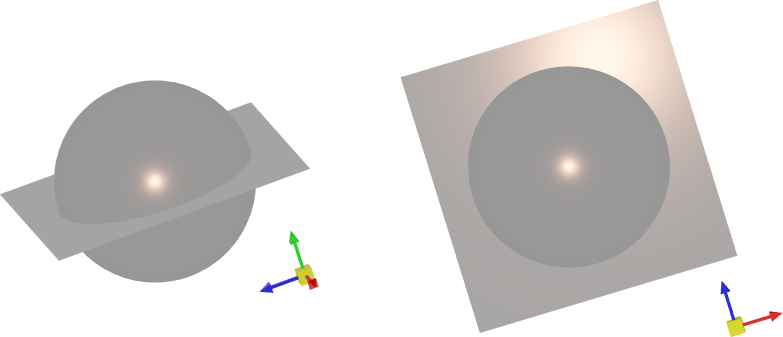
<mx3d:Graphics3DControl.Lights>
<mx3d:CameraPointLight Color="{Binding MyLightColor}" Radius="10"/>
</mx3d:Graphics3DControl.Lights>
using Eremex.AvaloniaUI.Controls3D;
CameraPointLight myLight = new CameraPointLight();
myLight.Radius = 10;
myLight.Color = Avalonia.Media.Colors.Coral;
g3DControl.Lights.Add(myLight);
Camera-related Directional Light¶
Emits parallel rays in the camera's direction, simulating distant illumination (like sunlight).
Class¶
CameraDirectionalLight
Settings¶
Color— The color of the light.
Example¶
The following example creates a Directional Light linked with the camera. The image below demonstrates this light reflected from metallic plane and sphere.
